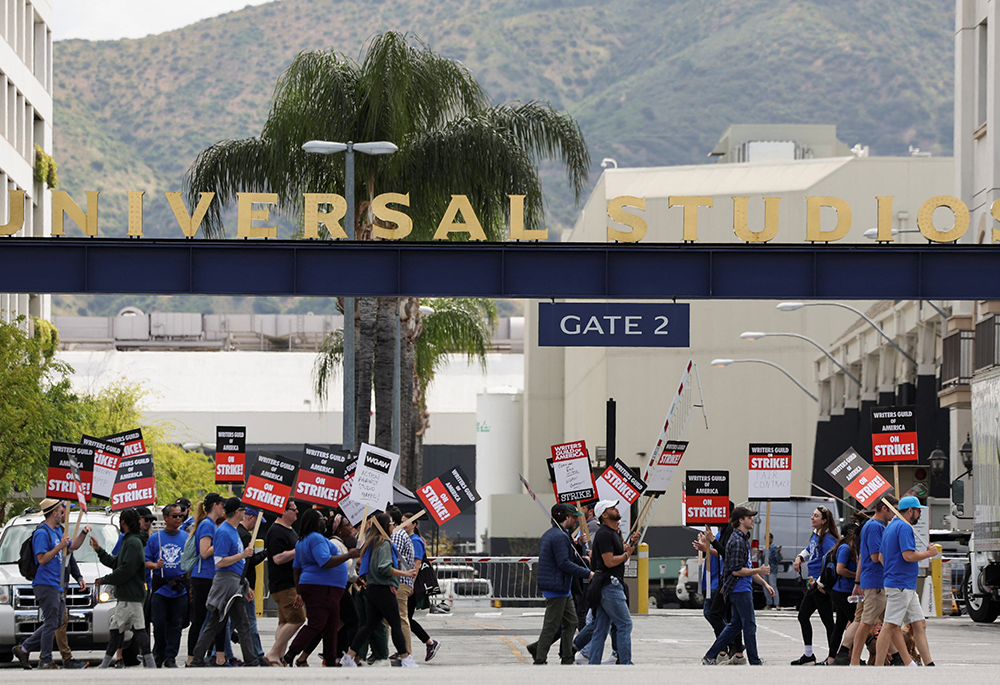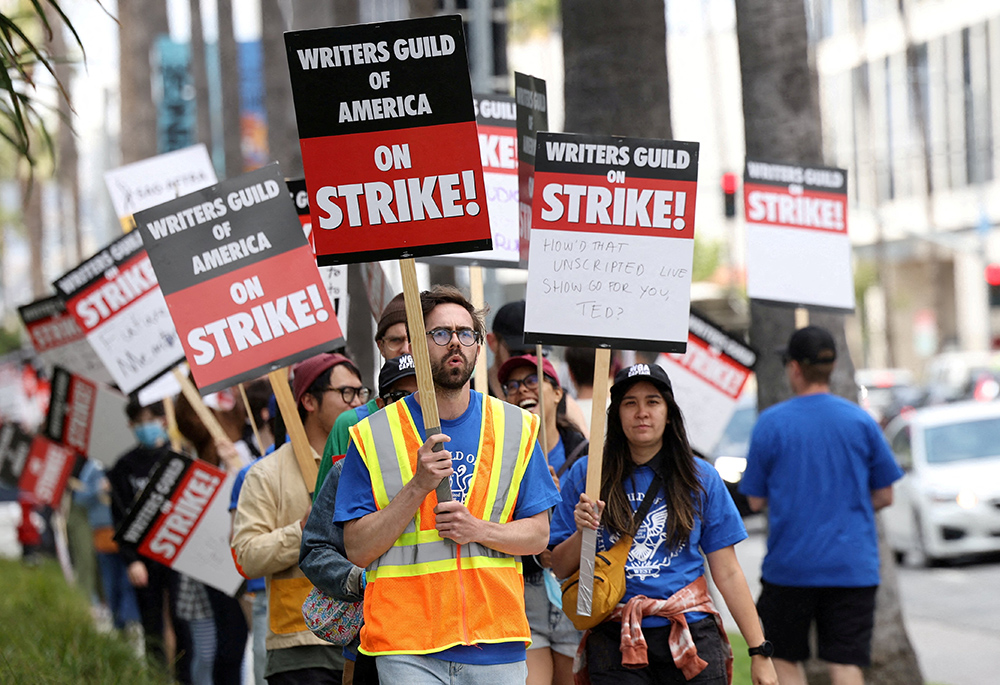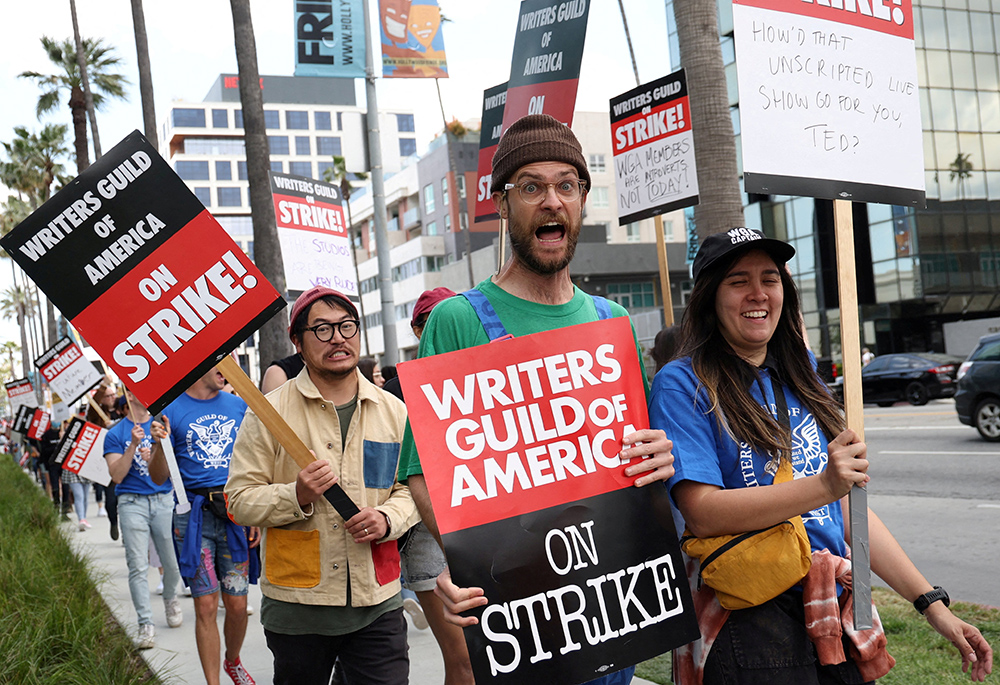
Workers and supporters of the Writers Guild of America protest outside Universal Studios Hollywood May 3, in the Universal City area of Los Angeles a day after union negotiators called a strike for film and television writers. (OSV News/Reuters/Mario Anzuoni)
It's impossible to miss the weekslong news images of chanting, picketing writers disrupting or shutting down movies and TV series shooting at practical locations and studio facilities from Burbank to Chicago to New York.
Should Catholics care? Pick a side? Let's talk about it.
Negotiations over a new three-year deal between the Writers Guild of America and the studios and networks that employ its members officially broke off May 1, and writers hit the bricks in force the next day. The Writers Guild of America, or WGA, is getting broad support from its sibling entertainment unions including actors, electricians, stagehands and Teamsters.
It's been 15 years since the last Writers Guild of America walkout in 2007-08, a strike that similarly halted production of most TV series and movies and lasted for 100 days. No one on either side of what writers say is an "existential" negotiation is predicting this one will be any shorter.
Networks and studios are represented by the Association of Motion Picture and Television Producers, or AMPTP. They claim their "emerging" business models — streaming, multiplatform subscriptions and pricey short-run series — make profits hard to come by, which in turn makes their companies' future income uncertain.
Writers counter that these companies make enough from their "emerging" new business models to pay a few of their CEOs more than the total-dollar increase the Writers Guild of America has asked for over its entire three-year deal.
They contend mid-level staffers who used to see 20-40 weeks of work every season find themselves working 10 weeks every two or three seasons — for less money per week, on bigger hits. Newer writers and women, who often spend a decade or more before managing to finally "break in" to WGA work, are discovering they can't afford to stay in. And the residuals that used to sustain writers through employment gaps have all but disappeared.

Writers Guild of America members and supporters picket outside Sunset Bronson Studios and Netflix Studios May 3 in Los Angeles, a day after union negotiators called a strike for film and television writers. (OSV News/Reuters/Mario Anzuoni)
Full disclosure: I've been a member of the Writers Guild of America since 1970, first as a news writer then moving to writing and directing TV series, so I won't pretend this is an emotionless, scholarly examination of the merits of both sides. I'm a union guy through and through.
Obviously my loyalty is with the writers on the picket line. They include younger writers, women and POCs (persons of color) in greater numbers than I've ever seen. By contrast, if I close my eyes and think of previous WGA picket lines, what it brings up are images of mostly OWGs (older white guys).
So I won't try to play "devil's advocate" for the management side of this fight. As my favorite teacher, Fr. Luis Olivares, would remind me, "The devil doesn't need an advocate, Timothy, he's already the devil."
But I've been a Catholic even longer than I've been a WGA member, educated in turn by no-nonsense Carmelite nuns, lovely Claretian missionaries and ever-curious Jesuits. So perhaps I can be forgiven for noodling around with whether our faith informs us which side of a picket line we ought to be standing on.
Having covered the United Farm Workers union's grape and lettuce boycotts from Ventura County to the Central Valley in the 1970s as a young documentary writer, that would have been an easy call for me.

Writers Guild of America members and supporters picket outside Sunset Bronson Studios and Netflix Studios May 3 in Los Angeles, a day after union negotiators called a strike for film and television writers. (OSV News/Reuters/Mario Anzuoni)
UFW founder (and devout Catholic) Cesar Chavez always seemed about three-deep in priests and nuns. That was because the local clergy were backing their parishioners, the workers picking the lettuce, not the giant agribusiness corporations Chavez accused of exploiting them.
But how do things shake out today in a more "complicated" union organizing situation? Say, teachers trying to unionize a Catholic school? A pastor might warn his already strapped parishioners that a union's high salary demands and possible strikes could make their children's religious educations even more expensive. Similar concerns come up when nurses and other workers attempt to organize at some Catholic-owned hospitals.
So is the implication the church teaches that a certain flavor of union busting can be OK? The Jesuits taught me that kind of reasoning represents the ethical relativism known as situational ethics. A scriptural example was when Jesus healed a man's withered hand, but jealous Pharisees criticized him for doing this "work" on the Sabbath.
If you wonder, as I did, whether the popes have weighed in on unionism, boy have they ever.
In a 2017 message to labor leaders Pope Francis said, "There is no good society without a good union," also calling on unions to do more to protect non-union members, "those who do not yet have rights, those who are excluded from work and who are also excluded from rights and from democracy."
In Rerum Novarum, the papal encyclical often considered a founding document of modern Catholic social teaching, Pope Leo XIII called on the faithful to "save unfortunate working people from the cruelty of men of greed, who use human beings as mere instruments for money-making."
Even though he wrote that back in 1891, it does sound a bit like the overpaid CEOs the Writers Guild of America is complaining about today, no?
Ninety years later, Pope John Paul II wrote in his 1981 encyclical Laborem Exercens that "workers should be assured of the right to strike, without being subjected to personal penal sanctions for taking part in a strike." That's fairly unambiguous.
Advertisement
Writers as a rule try to be faithful to original source material whenever possible and, as you probably know, Jesus never specifically endorsed unionism. While he certainly said, "Thou shalt love thy neighbor as thyself," nobody can show me where he added, "... and thou shalt bargain-eth collectively with him."
But beyond literal Scripture, I believe the so-called "politics" of Jesus as expressed in the Bible urge us — command us? — to support exploited workers as Jesus would if he somehow appeared today on a picket line at Universal City, or at a grape boycott in Salinas.
The WGA's bottom line: Writers believe that the way they're compensated is broken and needs to be addressed contractually, and they will stay on the picket line as long as that takes.
The AMPTP's bottom line: No counteroffer, no new talks, they closed a new three-year deal with directors and are currently negotiating with SAG-AFTRA .
So my advice is, sit back. This one could go on for a while.
And finally ... just for fun, since I used to imagine stuff for a living, I tried to envision how things might have changed if, instead of being just fishers of men, the Twelve Apostles were also card-carrying union men. (Make that Eleven Apostles. I had Judas as a pro-management guy way before he took the 30 pieces of silver and got a kiss named after him.)
My guess is that with some unions involved, events following the Last Supper could have looked more like this:
EXT. ENTRANCE, GARDEN OF GETHSEMANE - NIGHT
A CONFUSED ROMAN OFFICER AND HIS MEN WATCH AS 20 PEOPLE MARCH IN A CIRCLE AT THE GARDEN'S ENTRANCE, BLOCKING THE SOLDIERS' ACCESS.
THE APOSTLES AND SOME ALLIES CARRY CRUDELY LETTERED SIGNS:
"PHARISEES UN-PHAIR!" "MONEY-CHANGERS OUT OF THE TEMPLE!" AND "HAVE YOU HUGGED A PROSTITUTE TODAY?"(MARY MAGDALENE ONLY).
CENTURION
(grumbles to aide)
Nobody said we'd have to cross
a picket line ... My brother's
in the hut-thatcher's guild,
for Zeus' sake —
(then, to soldiers O.C.)
Guys, guys — no hugging the
prostitute!
PUSH PAST THEM TO ANOTHER PART OF THE GARDEN TO SEE:
JESUS
KNEELING IN FRONT OF A ROCK, PRAYING. HARD.
SENSES SOMEONE BEHIND HIM, IT'S THE APOSTLE, PETER.
PETER
Boss, I hate to interrupt you.
JESUS
Don't "hate" anything, Peter
— we talked about this.
PETER
My bad — so, the crooked
high priests sent the Romans
here to arrest you and
bring you to Pilate.
JESUS
(sighs, nods)
As my Father in Heaven foretold.
PETER
(proudly)
But as your union rep on Earth,
I just "fore-told" a Centurion
to shove it up his tiny Roman —
JESUS
— Peter!
PETER
Hey, don't stone the messenger. ...
Just biblical fan-fic, you say? I say for all we know the commotion might have confused the Romans enough to back off, regroup and try again after the Next Last Supper. Maybe even Judas has a change of heart, gives back the 30 pieces of silver and rejoins the fold.
And if the carpenters' local (Jesus was one of their own, after all) honored the apostles' picket line? No wooden anything would've made it to Golgotha. Jesus' enemies would have at the very least had to come up with a no-cross workaround.
OK, I suddenly hear my Carmelite, Claretian and Jesuit teachers loudly calling a "wrap!" on this episode of Heresy Minute. But hopefully this gets you thinking about where unionism and your own faith merge — or collide.






